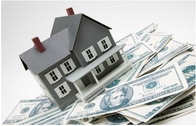Advertisement
Seniors Have Most Equity in Homes in Four Years

Americans 62-years old and older now have more equity in their homes than at any time in the last four years, according to data released by the National Reverse Mortgage Lenders Association (NRMLA). The new information comes from the NRMLA/RiskSpan Reverse Mortgage Market Index (RMMI), which analyzes trends in the home values, home equity, and mortgage debt of homeowners 62 and older. The RMMI is updated quarterly and tracks back to the start of 2000.
“Today’s report continues a positive trend for the American housing market and for senior homeowners. With home values recovering and equity increasing, seniors will have more financial resources available to them during retirement,” said Peter Bell, president of NRMLA. “With proper planning, using a reverse mortgage to access that equity is one option to help fund living expenses, home maintenance costs, or health care needs.”
In the first quarter of 2013, the RMMI reached its highest level (154.95) since the first quarter of 2009. After falling to start 2012, the RMMI increased slightly in the second quarter before showing significant growth in the third and fourth quarters. That trend continues in the most recent data.
The aggregate home equity held by Americans 62 and older grew 6.4 percent over the past year to a total of $3.25 trillion–a four-year high.
The $49.5 billion increase in senior home equity from the last quarter of 2012 to the first quarter of 2013 was driven by an estimated $45.1 billion increase in the aggregate value of housing owned by Americans 62 and older while their collective mortgage debt declined by $4.4 billion. The mortgage debt for Americans 62 and older stands at $1.07 trillion – its lowest level since the third quarter of 2007. Senior mortgage debt peaked at $1.14 trillion in the third quarter of 2010.
The housing value estimate used in the RMMI is based on the Federal Housing Finance Agency’s Q1 2013 all-transactions Indices, which saw housing values increase in 53 percent of the 395 MSAs covered by RiskSpan.
Going back to the start of 2000, the RMMI peaked at 191.21 in the fourth quarter of 2006, when the home equity held by Americans 62 and older reached its highest level of $4 trillion. Since that high water mark, home values have declined 12.7 percent for homeowners 62 and older, and their collective home equity has declined by 19 percent.
Over the long term, however, home equity has proven to be a valuable resource. The collective home equity of Americans 62 and older has grown by 55 percent since the RMMI’s starting point. In Q1 of 2000, seniors owned $2.10 trillion in home equity, compared to $3.25 trillion today.
Overall, the home equity held by American homeowners of all ages stood at $6.94 trillion in the latest data, its highest level since the second quarter of 2008. Since the RMMI’s starting point, Americans’ total home equity has grown by 29 percent.
About the author





